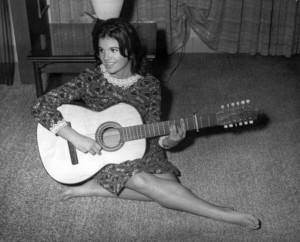Why Linda Still Matters To Tucson

Why Linda Ronstadt Still Matters to Tucson
A Tucson music historian reflects on the lasting influence of our city’s most famous musical export
Linda Ronstadt’s singing days are over but her hometown’s love affair with the storied singer is anything but.
And that love affair goes both ways. She still owns a home in Tucson, keeps in touch with her childhood friends and remains inquisitive about goings-on in her hometown.
Part of Tucson’s attachment to Ronstadt is that she is so much a Tucson girl.
Ronstadt grew up just off Prince Road in a small house next to a massive cottonwood tree, now torn down. It was in her childhood house that, on her second birthday, the father of Chicano music—Lalo Guerrero—awoke her with a birthday serenade. Guerrero was a close friend of her father, Gilbert Ronstadt, who ran the family hardware business downtown.
The Ronstadt family was a musical bunch that shared songs in sibling harmony every night as the dishes were washed and put away. Her dad was an eclectic and tasteful music lover whose well-worn record collection ran the gamut from Nelson Riddle American standards to mariachis and ranchera singers.
As a child, Linda grew up in the musical shadow of her older brother, Peter, who would later become Tucson’s chief of police. Pete was a gifted boy soprano soloist in the Tucson Arizona Boys Chorus until one summer when his voice suddenly plunged into the bass-baritone register. But in his Boys Chorus days, Linda was his understudy, learning all of the repertoire he would sing, including the Pirates of Penzance, which she would later record.
She followed Pete into the coffeehouses of Tucson, singing harmony at first and growing stronger in finding her own voice. She attended the University of Arizona, as she says, “for about a minute,” before heading to California to work on being discovered.
Her musical career is one of integrity from beginning to end. She was disciplined and hard-working, with a gift for finding material that fit both her voice and spirit. She surrounded herself with the best talent she could find throughout her career—from the Stone Poneys days, through the times when the Eagles backed her up, and on to American standards with Nelson Riddle, country with Emmylou Harris and Dolly Parton, and ranchera recordings with Mariachi Vargas, Los Camperos de Nati Cano and the best of that world. She made her voice a vehicle for many of the best songwriters of the day, from Warren Zevon to Jackson Browne, Lowell George, Jimmy Webb, Karla Bonoff and many more.
She brought recording business back to Tucson whenever she could, often laying down vocal tracks and doing mastering in local studios. Ronstadt even recorded one whole album here —The Western Wall, with Emmylou Harris, recorded at the Arizona Inn.
People still talk about seeing her in local coffeehouses as a young girl, or singing “Tumbling Dice” with Mick Jagger and the Rolling Stones at the Tucson Convention Center. Her performances of classics from the golden era of mariachi helped the genre gain a second wind, and forced the Tucson International Mariachi Conference to add an extra night to its performances. And at one of those mariachi appearances she showed her love for Lalo Guerrero by acting as the backup singer for the man who serenaded her when she turned 2.
She took a personal interest in fledgling mariachi and ranchera singers from Tucson, including Monica Treviño, and introduced the members of Tucson’s Mariachi Cobre to her vocal coach, after which Cobre set the standard for vocal work for years. And along with giants Mariachi Vargas de Tecalitlán and Los Camperos de Nati Cano, she turned to Cobre and Tucsonan Gilbert Velez’s group to record with her on her Canciones de Mi Padre and Mas Canciones CDs.
When she began touring with symphony orchestras, singing American standards, Ronstadt turned to Tucson jazz icon Jeff Haskell to write arrangements and often to serve as conductor on the tours. And on a personal note, Linda generously agreed to be on the advisory board on this writer’s film on mariachis in Tucson.
Tucson loves her as much for the person she is as for her musicianship. Courageous, opinionated, outspoken and proud of her roots, she is well read, well informed and ready to get involved in whatever flips her switch.
When SB 1070 was signed, she was among the first rallying to protest at the state Capitol in Phoenix. And on several occasions she went door to door endorsing local candidates for office that she believed in.
When victims of domestic violence in Tucson had nowhere to go to escape, either by themselves or with their children, Ronstadt ponied up the money to build the Casa De Los Niños battered women shelter. Her caring for our city and for those most vulnerable has never ceased.
But no doubt Linda Ronstadt’s greatest connection to her hometown has been the inspiration for every aspiring young singer this city has produced. Every local young belter has a Linda Ronstadt tune in the hip pocket. And every mariachi has a tune or two learned first from Linda Ronstadt.
Daniel Buckley is currently working on his 8th documentary film, The Mariachi Miracle (AKAMariachis Transform Tucson). For more go to http://www.danielbuckleyarts.com.




Best wishes to Linda on reaching her 70th birthday. She has been an inspiration to several generations of female singers, and it’s heartening to know that she is still highly thought of in her own hometown. Even though Parkinson’s has silenced that enormous singing voice of hers, she still remains a force to be reckoned with.